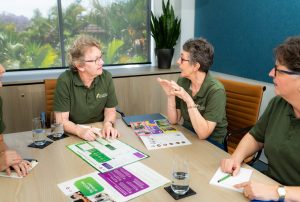We all have a right to make decisions about things that shape or impact our lives. These can be everyday decisions like what to wear and what to eat. It can also be big decisions like where to live or our relationships.
We often get support from other people to make decisions. This includes asking people their opinion, seeking advice or talking to professionals. For people with disability, especially those with cognitive or intellectual disability, the right to make decisions about themselves is often overlooked – and the consequences can be harmful. People with an intellectual disability have the same human right to make their own decisions as other people.
Some people with an intellectual disability might need additional support to make their own decisions. This is called supported decision making.
So what is supported decision making?
Supported decision making is a legal framework which promotes the rights of people with disability to make their own choices. It usually involves support from a team of trusted people chosen by the person with disability – often family members, friends or nominees. The team will work with the person to help them to understand information, express preferences and make informed decisions.
The person or people who help make decisions are called ‘Decision Supporters’. They don’t make decisions for people with disability, rather they help individuals to come to their own decisions about the choices they want to make.
In the context of the NDIS, supported decision making refers to the provision of assistance and support to individuals with disabilities to make their own decisions regarding their NDIS plans and the supports and services they receive. It recognises that individuals with disabilities have the right to make choices about their lives and have control over the supports they receive.
Participants are encouraged to actively participate in decision-making processes and to have their preferences, goal, and aspirations considered. Supported decision-making recognises some individuals may require varying levels of support to understand, navigate and make informed decisions within the NDIS framework.
The NDIS provides various mechanisms to facilitate supported decision-making, including:
- Support Coordination: The NDIS offers support coordination services to assist participants in understanding their plans, accessing supports, and making informed decisions. Support coordinators work closely with participants, helping them build their capacity to manage their NDIS funds and make choices aligned with their goals.
- Plan Review Meetings: Participants have the opportunity to attend plan review meetings where they can discuss their goals, needs, and desired supports with their support coordinator and other relevant parties. This allows participants to actively contribute to the decision-making process and shape their future plans.
- Advocacy and Information Services: The NDIS provides funding for advocacy and information services to ensure participants have access to independent support and guidance. These services can help participants understand their rights, navigate the NDIS system, and make decisions that align with their preferences and goals.
The aim of supported decision making within the NDIS is to empower participants, enhance their self-determination and promote their active involvement in shaping their supports and services. By providing the necessary assistance and accommodations, the NDIS aims to ensure that participants can exercise their rights and make decisions that best suit their individual circumstances.
How does supported decision making work?
Until now, there have been limited formal guidelines around supported decision making, perhaps because everyone involved is so diverse.
However, in early May 2023 the NDIA released a new supported decision making policy. You can find information about the policy, how it will be rolled out and how it was co-designed with people with disability here.
The policy will be implemented during 2023 and beyond and is designed to empower NDIS participants to make decisions that relate to their plans and funding for themselves.
That policy is for supported decision making and how it relates to the NDIS, but there’s also a report from the Disability Royal Commission as well as an explainer video with transcript, here.
Out of this report has come a recommendation for ‘nine universal principles’ to inform a framework for supported decision making. The first four were conceptualised in 2014, while the remaining five came from a recent review.
The nine principles allow consistency and guidance for people with disability who need supported decision making and provide support and expectations for the team assisting with the process.
The nine principles are:
- The equal right to make decisions – understanding that all adults have the right to make decisions about their own lives and have those decisions respected.
- Support – everyone who requires support to make decisions must be provided with access to that support.
- Will, preferences and rights – whether it is their will, an indication of what they prefer, or their human right, it directs decisions that affect the lives of people who use supported decision making.
- Safeguards – there must be effective safeguards in the laws, legal frameworks and policy frameworks to prevent abuse or influence of the people with disability using supported decision making.
- Principled approach to supported decision making – the person with disability’s stated or perceived ‘will and preferences’ must be kept at the heart of decision making.
- Best interpretation of will and preferences – in the rare times when the person with disability’s will and preferences have not been able to be drawn out, a decision should be made based on the best interpretation of what the person’s will and intention would likely be.
- Dignity and risk – taking risks is important. However if, in limited circumstances, the person with disability’s decision will place them at risk of serious impending physical or financial risk, with lasting consequences (including criminal or civil action), and they cannot understand the consequences, even with support, alternative decision making may be applied with the person’s personal and social wellbeing as a priority.
- Distributional equity – people who have struggled to access supported decision making should be given priority in new programs.
- Co-leadership of people with cognitive disabilities – people with cognitive disabilities, and their supporters, should lead consultation and design on reform and initiatives related to supported decision making.
Getting started with supported decision making
If you are a person with a disability, you could talk to someone you trust and perhaps you could share this article with them. If you have a support provider you’re working with, you could find out if they offer supported decision making.
Alternatively, Inclusion Australia has developed valuable resources under the guidance of people with intellectual disability which can help get you started.
Much like any skill, you’ll get better at supported decision making by practising. If you’ve never had the opportunity to make decisions for yourself, it can feel unnatural or overwhelming when you start making your own choices.
But it’s worth persisting. It’s not about being perfect or making the ‘correct’ decision every time. It’s about having the dignity to make mistakes and learn from them. It’s about being able to make choices that are right for you, not what other people think is best for you.
Image: Fizkes – stock.adobe.com





